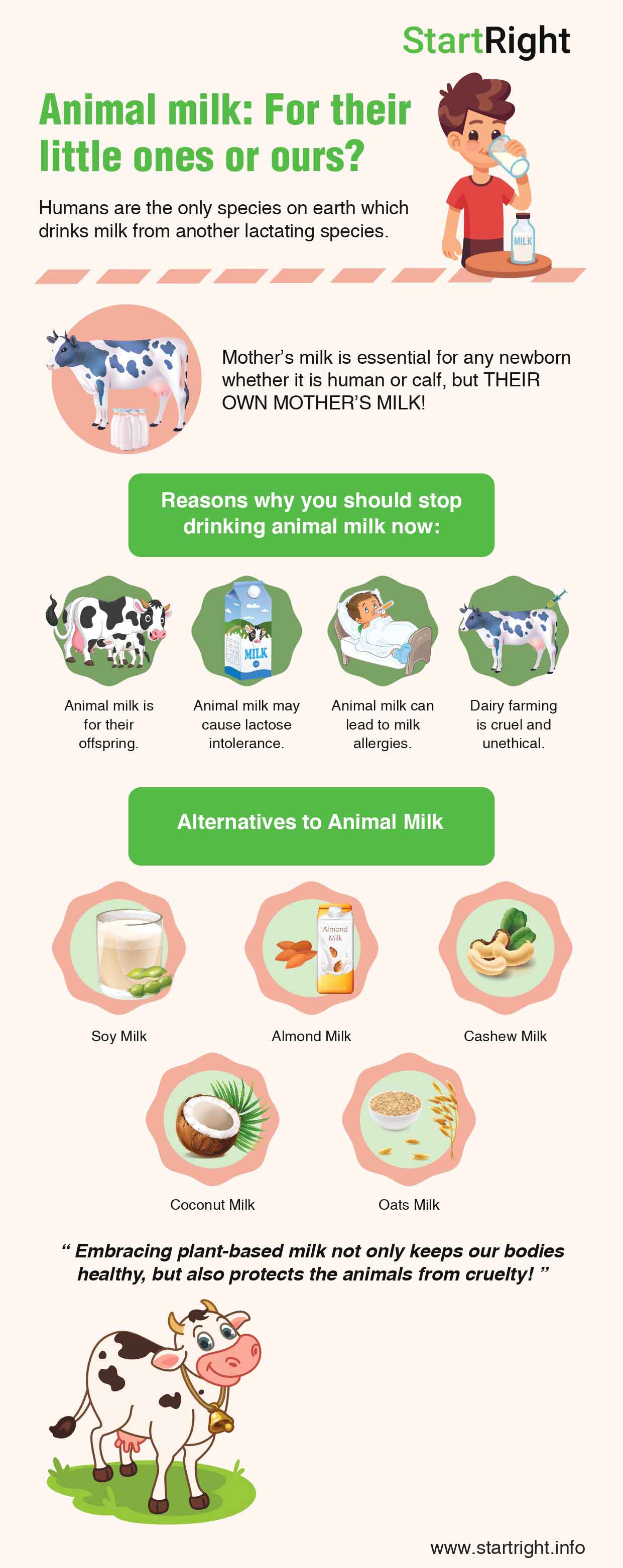Milk has always been a part of our diet from ancient times. However, some recent studies have raised the question over the consumption of animal milk by humans.
Unequivocally, mother’s milk is essential for any newborn whether it is a human baby or calf. Mother’s milk is the nature’s gift for the little ones of all lactating species. However, in humans it is very peculiar that once the mother is done with nursing her baby, her role is taken by other mammals! This practice makes humans the only species on earth which drinks milk from another lactating species.
Infographic Click Here | Following weaning, animal milk becomes an important part of human diet, mostly for their nutrient benefits, especially calcium. However, these nutritional benefits can be availed from plant-based milks also, which implies that it is no more necessary to do animal farming for dairy and dairy products. If you still think that animal milk is good for human, here are a few more reasons why you should stop drinking animal milk now. |
- Animal milk is for their offspring, not ours: Human milk has a different composition than the cow’s milk or goat’s milk or other mammal’s milk. Cow’s milk is made for the calves’ unique growth and development needs while the human milk is made for their babies’ development and growth. For example, human babies need to develop their brain and nerves quickly, so human milk is rich in fat and less in protein, whereas the calves need to develop their muscles quickly and hence cow’s milk has more protein than human milk.
- Animal milk can cause lactose intolerance. Milk sugar is known as lactose. Humans as infants produce an enzyme called lactase, which enables the digestion of lactose in the breastmilk. Once weaned off breast milk, lactase production stops. When we start consuming animal milk, digesting lactose-laden milk becomes difficult. Additionally, pasteurization and homogenization of animal milk denatures the proteins making it harder to digest. Difficulty with dairy digestion can create a terrible imbalance in the body and results in nausea, cramps, gas, bloating, and diarrhea. You might not have heard of anyone who developed lactose intolerance towards their mother’s milk!
- Animal milk can lead to milk allergies: Young children or infants consuming animal milk can develop allergic reactions to milk proteins. Milk mainly consists of two proteins: casein and whey. Cow’s milk has twenty times more casein than human milk, which puts a huge pressure on human digestion. Cow’s milk protein allergy (CMPA) is the most common food allergy in babies younger than one year of age.
- Dairy farming is cruel and unethical: Animals that are raised for their milk are repeatedly impregnated and their babies are taken away to collect milk from them. When they are exhausted and can no longer provide enough milk, they are sent for slaughtering. Additionally, these animals are injected with various hormones such as rBGH, a genetically engineered Bovine Growth Hormone to increase milk production. These synthetic hormones are harmful for the animal and also have been linked to many cancers.
What if you can’t breastfeed your baby?
Some mothers may not be able to breastfeed their newborn and may need to supplement milk. In such cases, pediatrician may recommend supplementing breastmilk with formula milk or cow milk (in rare cases) depending on the baby’s health.
Is there any alternative to animal milk?
As we are habituated to the use of milk in our everyday diet, to stay away from these dairy products is a task. The good news is that there are many nondairy alternatives available which can be used every day without missing out on the nutrition and taste. These alternatives can be easily made at home and are healthy.
These include:
- Soy milk
- Almond milk
- Cashew milk
- Rice milk
- Coconut milk
- Oats milk
And if your still skeptical about meeting your dietary requirements of calcium, try including more almonds, spinach, broccoli, sesame seeds, sprouted sunflower seeds, etc. in your diet. Dieticians say that four tablespoons of tahini (sesame paste) have the same amount of calcium as a cup of cow’s milk!
So, its high time, we move past animal milk and embrace the equally nutritious plant-based milk. Not only it helps keep our bodies healthy, but also protects the animals from cruelty!
Reference:
- 12 Reasons to Stop Drinking Cow’s Milk.
https://www.peta.org/living/food/reasons-stop-drinking-milk/
Accessed on: 03-11-2020. - Cows’ milk is ideal for calves not humans. Here’s why!
https://www.viva.org.uk/why-you-dont-need-dairy-drinking-milk-unnatural/cows%E2%80%99-milk-ideal-calves-not-humans
Accessed on: 03-11-2020. - Want Milk? Is Cow’s Milk Meant For Human Consumption?
https://www.onegreenplanet.org/lifestyle/is-cows-milk-meant-for-human-consumption-part-1/
Accessed on: 03-11-2020. - Differences between Human milk and Cow milk.
http://tmrinternational.org/why-you-should-not-give-your-baby-cow-or-any-animal-milk/
Accessed on: 03-11-2020.








































